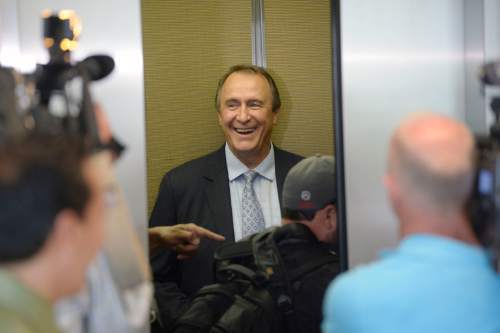This is an archived article that was published on sltrib.com in 2016, and information in the article may be outdated. It is provided only for personal research purposes and may not be reprinted.
When he was acquitted of fraud and theft charges by a New York state jury in 1987, Ray Donovan, who had been forced out of his job as U.S. secretary of labor by the scandal, asked the plaintive question, "Which office do I go to to get my reputation back?"
Even if there were such a place, that option would not be available to Mark Shurtleff.
Frustrated prosecutors Monday sought dismissal of all criminal charges against Shurtleff. But there remains no question that the former three-term attorney general of Utah brought dishonor on himself and his office through a series of highly questionable actions involving people who had been charged with, or were under investigation for, serious crimes.
After years of scandal, state and federal investigations and, two years ago last week, the filing of criminal charges against Shurtleff and his successor, John Swallow, the prosecutor working the Shurtleff case Monday asked the judge to let the charges go.
But there is no question that, under Shurtleff and Swallow, the Office of the Utah Attorney General was besmirched by a pay-to-play ethos that had both office holders accepting — some said demanding — such gifts as vacations at swanky California golf resorts and rides on private jets — from people who were in a position to benefit greatly from winning Shurtleff's and Swallow's favor.
The basic wrongdoing at the heart of the case, even if it is never shown to be criminal, was outlined in a bold and far-reaching report of a special committee of the Utah House of Representatives. It found that so-called businessmen who were charged in state and federal court with swindling people out of millions of dollars had such frequent, and lucrative, dealings with both officials that no innocent or honorable spin could be put on it.
Davis County Attorney Troy Rawlings said Monday that, despite all of that, he could not, in good conscience, continue with the case against Shurtleff. He said, reasonably, that it would not be fair to Shurtleff — or to the cause of justice — to go on when federal officials who began, and then dropped, their own investigation of the two former attorneys general had not turned over all relevant evidence from their probe.
With neither the prosecutors nor the defense attorneys knowing what the feds knew — why they were looking at Shurtleff and Swallow and why they stopped — no trial would be totally fair.
There was also the real question of whether the delay deprived Shurtleff of his constitutional right to a speedy trial. And a recent U.S. Supreme Court case, throwing out federal charges against a former governor of Virginia, made it clear that merely accepting gifts from people who might benefit from government action is not grounds for a criminal case unless a firm quid pro quo could be established.
Salt Lake County District Attorney Sim Gill, who is prosecuting Swallow on similar charges, said that case will go forward.
No matter how it all comes out, some lessons from the scandal are clear. One is that Utah laws allowing unlimited campaign contributions are not cleansed by the state's extensive reporting requirements. Not when buying a prosecutor's favor makes it so worthwhile to hide gifts and their origins.
Another is that voters, maybe more so than law enforcement, have a duty to vet candidates and choose those who would bring honor to high office. That's a task that would be much easier if we were to put an end to the state's antiquated caucus/convention system and create a more open and competitive process.
Mark Shurtleff today can crow that he retains the presumption of legal innocence all of us are entitled to, that the charges filed against him did not stick. But he still wronged the people of Utah.



